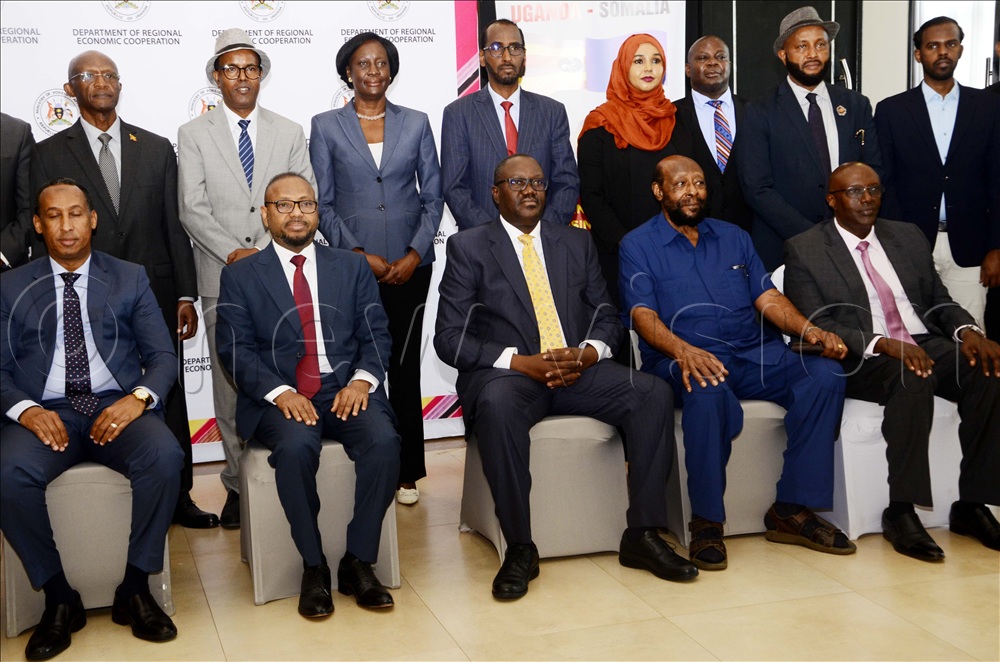Uganda-Somalia trade volume rises by sh10b in three years
“Uganda exports all our agricultural produce to Somalia, literally everything we grow. When we first held the JPC, our figures were less than one million US dollars [around 3.4 billion shillings]," he said.
Vincent Waiswa Bagiire, the Foreign Affairs PS addressing delegates during the second session of the Uganda-Somalia joint permanent commission at Mestil Hotel in Kampala on Wednesday, October 07, 2025. (Photos by Juliet Kasirye
________________
Uganda’s trade with Somalia has grown significantly, rising by over 10 billion shillings to 13.7 billion shillings within the last three years since the two nations first convened their Joint Permanent Commission (JPC) in 2022.
Vincent Bagiire Waiswa, the permanent secretary of Uganda's foreign affairs ministry who made the revelation, said the growth reflects strengthened bilateral ties and expanding market access for Ugandan goods.
“Uganda exports all our agricultural produce to Somalia, literally everything we grow. When we first held the JPC, our figures were less than one million US dollars [around 3.4 billion shillings]," he said.
Bagiire added that trade volumes have since increased to about four million US dollars (13.7 billion shillings), largely in Uganda’s favour.
“The more we do these sorts of events, the more we open up opportunities. There’s a notion that because Somalia has had challenges, those challenges are permanent - but they are not.”
The ministry PS made the remarks on Tuesday (October 7) during the second Uganda–Somalia JPC session held at Mestil Hotel in Kampala.
The diplomatic meeting brought together more than 80 high-ranking officials from both governments, including Somalia’s delegation led by Hamza Adan Haadooow.
'Deep and enduring ties'
The Ugandan delegation was headed by Bagiire and included representatives from the Uganda Peoples’ Defence Forces (UPDF), the Uganda Civil Aviation Authority (UCAA), and the foreign affairs ministries of both nations, alongside the respective envoys.
From left to Right: Ibrahim Ahmed Osman, director general ministry of commerce and industry in Somalia, Hamza Adan Hadow, Somalia Head of delegation, Vincent Waiswa Bagiire, Foreign Affairs PS, Prof. Sam Tulya-Muhika, Ambassador Richard Kabonero pose for a photo with other delegates during the second session of the Uganda-Somalia joint permanent commission at Mestil Hotel in Kampala on Wednesday, October 07, 2025. 
Adan commended the UPDF for its role in stabilising Somalia since its deployment in March 2007 under the African Union peacekeeping mission.
He said Uganda’s intervention helped create the peace and stability necessary for reconstruction and economic recovery in Somalia.
“Many Ugandans are working in Somalia in various sectors such as education and hospitality, and they are fine. The Somali government assures that whoever comes to Somalia, Ugandan or otherwise, will be treated as if they were in their home," he said.
The Somali delegation head praised Uganda for being the first country on the continent to deploy troops to Somalia and reaffirmed his government’s commitment to ensuring a safe environment for investors and workers.
“There is no discrimination at all. We need people to come to Somalia. We are now part of the East African Community and welcome everyone with expertise to support our development."
Adan also congratulated Uganda on its 62nd independence anniversary, to be celebrated this Thursday (October 9), calling it “a proud reminder of Uganda’s history, struggle for self-determination, unity, and progress”.
“Somalia joins you in celebrating this remarkable achievement. The friendship between Somalia and Uganda is deep and enduring.”
Bagiire further disclosed that the two countries are exploring new areas of co-operation, including education.
Efforts are underway to harmonise tuition fees for Somali students studying in Uganda, a move expected to boost revenue for Ugandan institutions hosting large numbers of Somali learners.